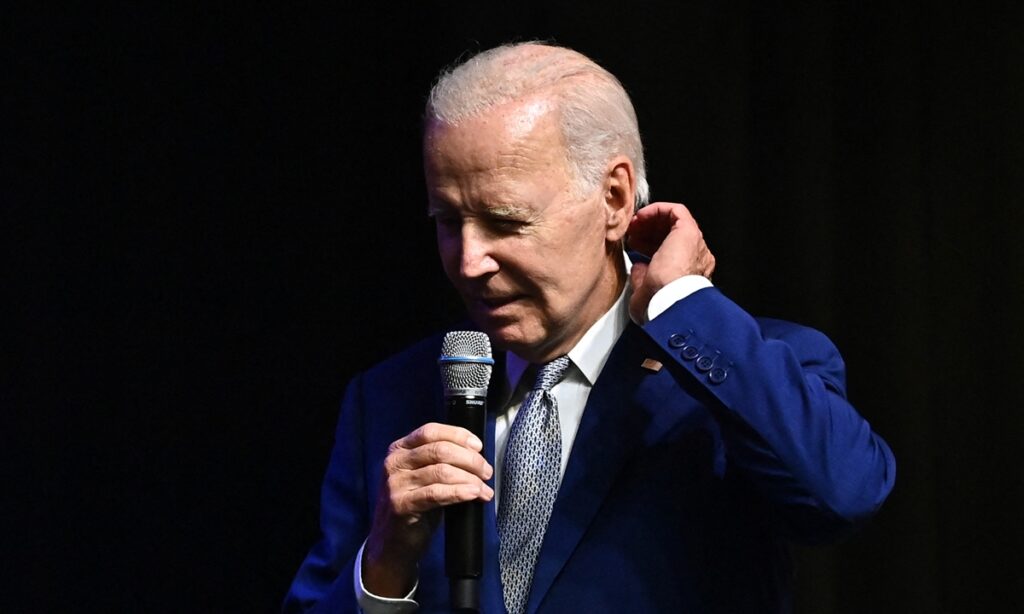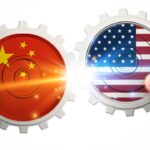US President Joe Biden said on Monday that the diplomatic sprint through Vietnam and India has “strengthened America’s leadership on the global stage.” However, it doesn’t seem to be welcomed by the American public.
Biden’s trip may “ultimately do little to alter his political fortunes back home, where his polling numbers are low” and there might be “a tight race against his predecessor, Donald J. Trump,” according to The New York Times on Monday.
Some Senate Democrats even said President Biden’s moribund poll numbers are “concerning” and “frustrating,” and they are doubtful whether “the White House will change how voters view him before the 2024 election.”
While there is still time before the climax of the election, Biden’s Asia trip has contributed little to helping him win favor within the US. What the president faces back home is a low approval rating and a host of domestic challenges.
Foreign diplomacy doesn’t concern the majority of American voters, nor is it a determinant in the general election, unless there is a major diplomatic crisis linked to domestic issues. Meanwhile, problems of real concern to the American public, such as gun violence, ethnic tensions and government shutdowns, have been left hanging.
Sun Chenghao, a fellow and head of US-EU program at Center for International Security and Strategy in Tsinghua University, believes that “it may be too early to judge the direct impact Biden’s diplomatic moves may have on the election or his approval rate.”
Nevertheless, the current US foreign diplomacy now seems to completely serve its internal policy. The complex situation of US domestic politics and a variety of challenges have scorched the Biden administration, forcing the president to transfer the pressure through external means, for example, creating geopolitical tensions or diplomatic results, to enhance domestic approval. In this way, foreign relations have become a tool for US politicians in partisan struggle.
When it comes to Biden’s rival, Sun added that while Trump has received great attention, it’s the group of voters in the middle that will ultimately decide the winner. If this group of people chooses Biden, it may not because they support him, but rather because they cannot accept Trump.
Wang Yiwei, director of the Institute of International Affairs at the Renmin University of China, added that “Biden is now trying to prevent Trump from coming to power by taking advantage of people’s concerns over Trump, and next year there will be more heated insults. In this way, the internal contradictions in the US will be further radicalized.”
At the same time, China-US relations are always a critical issue for both parties in US election. In this regard, Biden has inherited many of Trump’s policies toward China, and even further escalated the containment of China, especially in terms of technology blockade.
Although the Biden administration’s policy toward China has recently shown a positive signal, the overall tune remains containment. Biden now insists he’s not trying to “contain” China, but the high wall is only being built more solid. Taking the defeat of China as the top priority and campaign card will only cause the US to ignore its own internal problems and challenges, waste resources and time, and be plunged into unnecessary confrontation.
The US electoral politics itself has a string of drawbacks since its birth. Under this political election system, a policy may only last for four years, and bipartisan politics will bring about instability in national policy, be it the China policy, or other foreign policies. As a result, other countries will lower the expectations of the US policy.
Over time, the system has deviated from its original design to some extent, including the details of some rules in election, but it is difficult to carry out an overall reform, which has led to the disordered money-oriented politics in the US election.
The ills of unscrupulous American electoral politics is already a cliché, but they seem to be even more troublesome. Against the backdrop of the US exacerbating geopolitical contradictions, the world will pay for the failures of the American political system and party campaign. This will not only fail to resolve America’s own problems, but will also backfire and drag the world into the mire. Therefore, no matter who is elected, we hope that the US will put aside its selfish self-interest and zero-sum mentality, stop the “internalization” of foreign diplomacy, and seek for a win-win future.
(Global Times)




